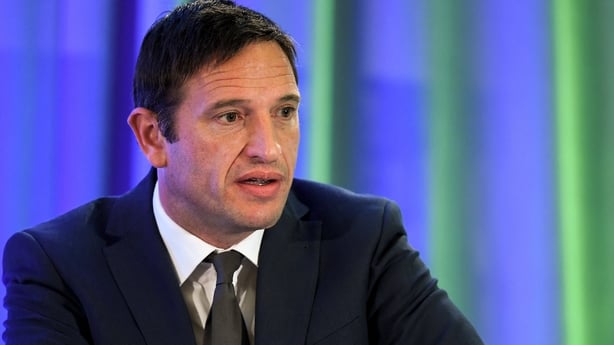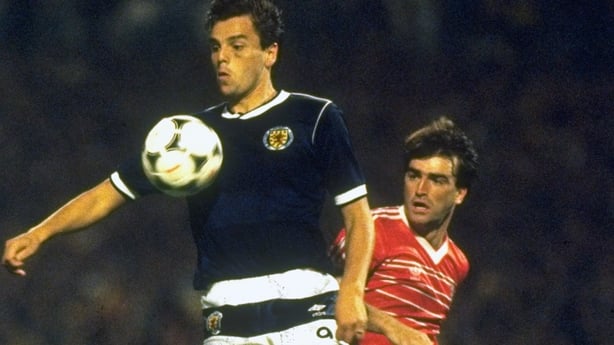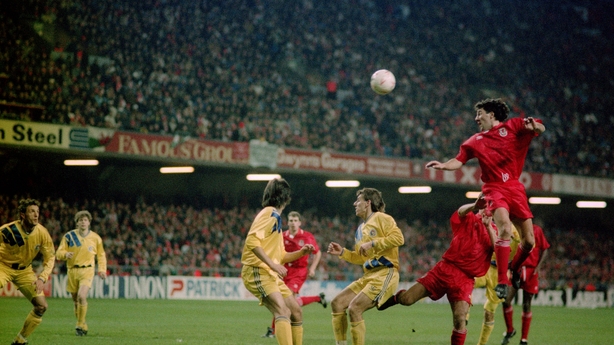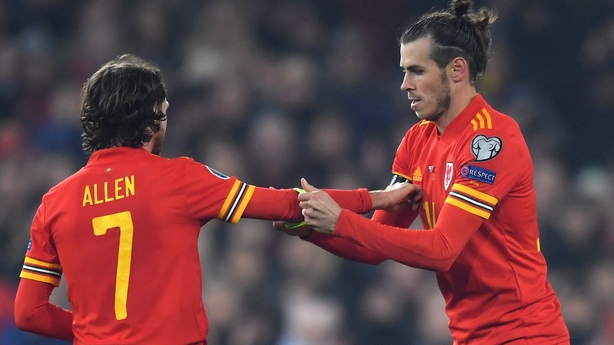While the Qatar World Cup may be stirring up only apathy elsewhere, the Welsh football fraternity can be forgiven their giddiness as they prepare for their first appearance on the game's biggest stage in 64 years.
The last time a Welsh team played in a World Cup match, they were seen off by a 17-year-old Pele. Tonight, they take on USA in the air-conditioned Ahmad bin Ali Stadium in Al Rayyan.
Accompanying them on their way to Qatar is their impossibly stirring anthem, 'Yma o Hyd' - a rather different affair from the usual jokey, throwaway stuff that constitutes the average World Cup song churned out by their big neighbours.
Written and performed by Dafydd Iwan - folk singer, Welsh language activist, former President of Plaid Cymru, once jailed for refusing to pay a fine for defacing English language road signs - the title translates as 'Still Here', and the song begins with the Romans departing Wales in 383AD. Not exactly 'Vindaloo'.
As has been well-flagged over here, the country's footballing CEO on this historic journey is a Limerick-born former Cork City goalkeeper.
"It reminds me of 1988, when we got to the Euros," FAW chief executive Noel Mooney told RTÉ Sport this week.
"When we got to Stuttgart and beat English... that was an awakening for Irish people. As someone who loved football and thought football was not out front in Ireland, '88 brought us out front and you saw hundreds if not thousands of football clubs emerging all over the country on the back of Big Jack's success.
"Euro 2016 in Wales did something very similar. You saw this emergence of football at the front. Rugby is the national sport but recently we see that football is the biggest interest sport. It's by far and away the biggest participation sport. We're really on an upward trajectory."

There's even evidence that the Welsh team's rise is altering the political landscape.
Interestingly, despite its perception as the upstart, 'unofficial' code in the country, the Welsh football team has become heavily associated with an insurgent Welsh nationalism, far more so than the beloved but generally apolitical rugby team.
As Prof Owen Worth of UL detailed on RTÉ Brainstorm this week, the official Welsh supporters club 'Red Wall' have a very close affinity with grassroots pro-independence groupings.
Worth wrote: "One could say that if rugby captures the obsession with a particular sport by a nation, then soccer represents a wider movement of national identity which is increasingly looking to re-define itself in light of a faltering United Kingdom."
Indeed, this could be the last tournament in which 'Wales' will be entered as a team, with a name change set to be debated after Qatar.
"The team should always be called Cymru, that's what we call it here," said Mooney recently.
Football was always the most popular sport in north and north-west Wales, where Plaid Cymru has tended to poll well and some of the game's most revered figures lean in a nationalist direction. When asked about the concept of a Team GB football team ahead of the 2012 Olympics, Neville Southall shot back, "What flag are they going to put up if they win it? The Union Jack? It's not my flag. My flag's a dragon."
Welsh agony through the years
'Despite it all, we're still here' is the refrain throughout 'Yma o Hyd'. The Welsh football team have certainly endured some torment in their oh-so long quest to return to the World Cup.
Indeed, name-checking the luminaries of Welsh football down the years, it may be a source of bafflement that they haven't reached this stage more often. The country has always had a happy penchant for producing superstars, but arguably failing to support them with adequate quality foot-soldiers. (Most of the time from the late 80s to the early 2010s, it could be said that Ireland's worst players were at a higher level than Wales' worst players).
In the early-to-mid 1980s, the Welsh boasted an especially powerful crop. They had, within their ranks, English football's most prolific goal-scorer (Ian Rush), English football's then finest goalkeeper (Neville Southall) as well a ferociously powerful Manchester United striker, known primarily for scoring screamers (Mark Hughes). For three tournaments running, they came agonisingly close to qualification.

For Spain '82, after winning their opening four games, a 2-2 home draw to longstanding irritants Iceland scuppered their chances, eventually missing out to Czechoslovakia on goal difference. Two years later, it was a Yugoslav equaliser nine minutes from time prevented them from becoming the only UK representative at Euro 84.
Perhaps their closest shave of all was in the Mexico '86 campaign.
After a 1-0 win at Hampden Park in March '85, Rush scoring the winner, they were the antagonists on a tragic night in Ninian Park that November, when Davie Cooper's late penalty denied the hosts an inter-continental playoff spot - considered a gimme at the time.
Welsh heartache would be rendered an afterthought by the grave news filtering out of the away dressing room.
In the midst of a tense, chaotic finale, Jock Stein collapsed, the ITV cameras briefly capturing the panicked scenes as the stricken Scotland boss was carted down the tunnel by his back-room staff. (A somewhat haunted looking Alex Ferguson - then still of Aberdeen - was the man in charge in the Scotland dugout for the final minutes of the game.)
Scottish euphoria at the final whistle soon after turned to grief following confirmation of Stein's passing and there was an air of hollowness surrounding their subsequent World Cup adventure. Meanwhile, Wales, so often treated as a marginal entity within the UK, became a side-issue even in the midst of one of their biggest footballing disappointments.
After making an utterly dismal fist of the 1990 qualifiers, the Welsh were back and re-energised under the management of Terry Yorath, who, in the spirit of the time, instituted a fairly uncomplicated gameplan.
They memorably took down the world champions Germany in a Euro qualifier in June '91 - the Germans may have been in one of their bleary-eyed post-World Cup hangover cycles, of the kind which Ireland made use of back in 2014/15 - though there was more heartache at the end, the Welsh finishing a point short after Die Mannschaft got their away win in Belgium that autumn.
The Welsh would subsequently write their own entry in the famous story of November 17th, 1993, the night when, amongst other things; a San Marino computer salesman placed a suitably tragi-comic full-stop on the Graham Taylor era; Jack Charlton bid adieu to Billy Bingham with a cry of 'Up Yours'; and Gerard Houllier and David Ginola became enemies for life.
(Rob Smyth has, of course, written the definitive compendium of that evening in the Guardian).
The Welsh were in a four-way tussle for two qualification spots in a thrillingly democratic group containing Romania, Belgium and an outfit then called 'The Representation of Czechs and Slovaks'.
With Belgium and I-can't-believe-it's-not-Czechoslovakia drawing 0-0 in Brussels, a win for Wales at home to the slick Romanians would have been enough. As Smyth noted, the BBC producers tired of watching a chastened England trundle in goal after goal in a futile win in Bologna and switched their main feed over to the Wales-Romania game, much to the disenchantment of the proto-EDL types.

Not uncoincidentally, the TV feed switched over in time for the game's pivotal moment, Wales' second half penalty. Early in the second half, Dean Saunders, Aston Villa's clever, impish striker had equalised Gheorgie Hagi's first half goal. Moments later - with excitement rising - Gary Speed flopped rather easily in the box, the ref signalling to the spot. Entering the closing stages, a goal would have put Wales through as-things-stood. But Swindon Town full-back Paul Bodin thundered his spot-kick off the crossbar, Welsh hearts sagging as the ball ballooned into the sky. The chance was gone and the Romanians finagled a late winner to doom Wales' chances of reaching the States.
The USA '94 failure appeared to break something in Wales and by the end of the decade, they had drifted back towards near-minnow status, dukeing it out with your Armenias and Moldovas for second last spot in the group. It was in this downbeat era that Ryan Giggs was jeered by the Welsh fans for his propensity to cry off friendlies, citing convenient hamstring strains (Friendly-itis was an ailment common to Manchester United players of the time as, ahem, Ireland fans will recall). They only revived when Mark Hughes took over the manager's job, making a spirited run at Euro 2004 qualification.
Golden generation
Welsh football is a world away from those dark days today. Euro 2016 semi-finalists, Euro 2020 last-16, now the 2022 World Cup, they have become consistent over-achievers. How was this change effected?
The BBC's Chris Wathan - the author of 'Together Stronger: The Rise of Welsh Football's Golden Generation' - has partially credited it to the high quality of coaching education in Wales, with its preoccupation with technique and small-sided games.
Ex-U21 boss Brian Flynn - a Welsh midfielder from the mid-70s to the mid-90s - conducted a Noel King-esque trawl through the English academies in search of players with Welsh blood, which yielded Ashley Williams and Hal Robson Kanu.

John Toshack, having managed seemingly every club in La Liga, returned to manage Wales for a second spell (the caveat being that his first stint in 1994 lasted 47 days) in 2004.
It was a trying time. Through his media work, Toshack had evidently offended a number of the older players and there was a spate of retirements almost from Day 1 - the late Gary Speed among them. In results' terms, it was a wretched period, qualification being reduced to the status of a pipe dream. However, Wathan has suggested that even this bore fruit later on, with several players being blooded who played a major part in Euro 2016.
A callow-looking Gareth Bale made one of his earliest competitive starts for Wales at right back in the first football international played at Croke Park - Irish football was in a ragged, unhappy phase at the time, although not so bad that we couldn't beat Wales that day.
Bale's emergence as a generational talent has naturally been the central factor in their rise up the European football eco-system. Even after he became afflicted with a strange career ennui in Madrid, eventually slipping off to semi-retirement in America, the Cardiff-born winger continued to turn out magnificent performances for the national team. If anything, his club-level frustration seemed to intensify his devotion to Wales.
Bale is hardly alone, however, with the likes of Aaron Ramsey, Joe Allen, and latterly David Brooks emerging as the type of stylish, creative players that Wales' Celtic neighbours pine after. Traditionally the weakest of the Celtic nations, they have emerged as the standard bearers in the modern era.
Euro 2016, as Mooney notes, was their 'Euro '88 moment'. Can Qatar 2022 - the rather objectionable location notwithstanding - be their answer to Italia '90?
Follow every game from the 2022 FIFA World Cup via live blogs on RTÉ.ie/sport and the RTÉ News app, or watch live on RTÉ Television and RTÉ Player








